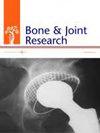The role of limb alignment on natural tibiofemoral kinematics and kinetics.
IF 5.1
2区 医学
Q2 CELL & TISSUE ENGINEERING
引用次数: 0
Abstract
Aims This study aimed to analyze kinematics and kinetics of the tibiofemoral joint in healthy subjects with valgus, neutral, and varus limb alignment throughout multiple gait activities using dynamic videofluoroscopy. Methods Five subjects with valgus, 12 with neutral, and ten with varus limb alignment were assessed during multiple complete cycles of level walking, downhill walking, and stair descent using a combination of dynamic videofluoroscopy, ground reaction force plates, and optical motion capture. Following 2D/3D registration, tibiofemoral kinematics and kinetics were compared between the three limb alignment groups. Results No significant differences for the rotational or translational patterns between the different limb alignment groups were found for level walking, downhill walking, or stair descent. Neutral and varus aligned subjects showed a mean centre of rotation located on the medial condyle for the loaded stance phase of all three gait activities. Valgus alignment, however, resulted in a centrally located centre of rotation for level and downhill walking, but a more medial centre of rotation during stair descent. Knee adduction/abduction moments were significantly influenced by limb alignment, with an increasing knee adduction moment from valgus through neutral to varus. Conclusion Limb alignment was not reflected in the condylar kinematics, but did significantly affect the knee adduction moment. Variations in frontal plane limb alignment seem not to be a main modulator of condylar kinematics. The presented data provide insights into the influence of anatomical parameters on tibiofemoral kinematics and kinetics towards enhancing clinical decision-making and surgical restoration of natural knee joint motion and loading.肢体排列对自然胫骨股骨运动学和动力学的作用。
方法采用动态视频荧光镜、地面反作用力板和光学运动捕捉相结合的方法,在平地行走、下坡行走和下楼梯的多个完整周期中对 5 名肢体外翻、12 名肢体中性和 10 名肢体内翻的受试者进行评估。结果在平地行走、下坡行走和下楼梯时,不同肢体排列组之间的旋转或平移模式没有发现明显差异。中立对齐和外翻对齐的受试者在所有三种步态活动的负重站立阶段的平均旋转中心都位于内侧髁上。而外翻对齐的受试者在平地和下坡行走时旋转中心位于中央,但在下楼梯时旋转中心更偏向内侧。膝关节内收/外展力矩受到肢体排列的显著影响,从外翻到中性再到内翻,膝关节内收力矩不断增加。额平面肢体排列的变化似乎不是髁运动学的主要调节因素。所提供的数据有助于深入了解解剖参数对胫骨股骨运动学和动力学的影响,从而提高临床决策和手术恢复膝关节自然运动和负荷的能力。
本文章由计算机程序翻译,如有差异,请以英文原文为准。
求助全文
约1分钟内获得全文
求助全文
来源期刊

Bone & Joint Research
CELL & TISSUE ENGINEERING-ORTHOPEDICS
CiteScore
7.40
自引率
23.90%
发文量
156
审稿时长
12 weeks
期刊介绍:
The gold open access journal for the musculoskeletal sciences.
Included in PubMed and available in PubMed Central.
 求助内容:
求助内容: 应助结果提醒方式:
应助结果提醒方式:


